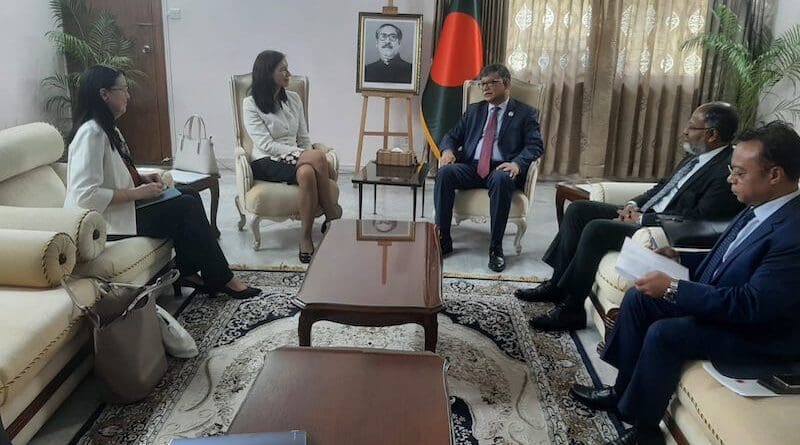Diplomatic Relations And Economic Prospects: Bangladesh-Estonia Partnership – OpEd
Ambassador Kristi Karelsohn, serving as the Director General overseeing the Asia Pacific region, Africa, and the Middle East at the esteemed Ministry of Foreign Affairs of Estonia, embarked on a significant diplomatic mission as she paid a courtesy visit to Foreign Secretary Ambassador Masud Bin Momen at the State Guest House Padma on April 1, 2024. This meeting marked a pivotal moment as it laid the groundwork for the inaugural Bilateral Foreign Office Consultations (FOC) between the nations of Bangladesh and Estonia, signifying a milestone in their diplomatic relations. Ambassador Masud Bin Momen warmly welcomed Ambassador Kristi Karelsohn, expressing sincere appreciation for her presence in Dhaka to initiate this historic dialogue.
Back in October 2022, during a meeting between Bangladesh’s ambassador to Estonia, Allama Siddiki, and Estonian foreign minister Urmas Reinsalu in Tallinn, Estonia, the latter expressed interest in importing pharmaceuticals and ocean-going ships from Bangladesh. Ambassador Siddiki assured that Bangladesh is prepared to meet Estonia’s demand for these products, highlighting their world-standard quality. Additionally, Siddiki sought Estonian assistance in advancing Bangladesh’s Information Technology (IT) sector as part of the government’s “Digital Bangladesh” campaign. The ambassador also urged Estonia to support the repatriation of Rohingyas from Bangladesh to Myanmar. Minister Reinsalu assured Estonia’s support for Rohingya repatriation and expressed commitment to maintaining regular diplomatic dialogues between the two countries.
In 2022, there was significant trade activity between Bangladesh and Estonia. Bangladesh exported substantial amounts of textiles ($48.5M), footwear and headwear ($1.42M), and animal products ($427k) to Estonia. Conversely, Estonia’s exports to Bangladesh mainly consisted of miscellaneous items ($144k), foodstuffs ($62.3k), and metals ($35k). Notably, the integration of information technology (IT) into industries is revolutionizing manufacturing processes, ushering in unprecedented transformation and innovation. Interconnectedness between industry and IT is increasingly vital, with Estonia exemplifying the potential of digitalization through projects like X-Road and Estfeed. Investment in IT solutions and automation is crucial for enterprises to embrace the fourth industrial revolution, enhancing competitiveness and productivity. Estonia aims to lead in smart production, attracting investment and fostering economic growth. Initiatives promoting technological education and talent attraction ensure a skilled workforce for the future. The concept of Industry 4.0 transcends borders, with nations worldwide embracing similar initiatives to thrive in a technology-driven global economy.
Moreover, in 2020, Estonia’s robust Information Technology (IT) industry flourished, generating €3.7 billion in revenue, a significant contribution amounting to 7.5% of the nation’s GDP. This thriving sector underscores Estonia’s prowess in digital innovation and technological advancement. For Bangladesh, there exist ample opportunities to leverage Estonia’s success in IT as a model for development. By fostering collaborations, sharing expertise, and adopting best practices, Bangladesh can tap into Estonia’s wealth of knowledge and experience to bolster its own IT sector. This partnership holds the potential to drive economic growth, enhance digital infrastructure, and empower Bangladesh in harnessing the transformative potential of technology. Embracing such opportunities for collaboration can pave the way for mutual benefits, fostering innovation, and contributing to the socio-economic advancement of both nations.
During their cordial discussions on April 1, 2024, Ambassador Masud Bin Momen took note of Estonia’s commendable advancements in the realm of Information and Communication Technology (ICT) and expressed keen interest in leveraging Estonia’s expertise, particularly in the cutting-edge technologies associated with the Fourth Industrial Revolution (4IR). In light of this, he articulated Bangladesh’s aspiration for closer collaboration and knowledge exchange in these transformative fields. Additionally, Ambassador Masud Bin Momen advocated for an expansion of educational opportunities for Bangladeshi students in Estonia, emphasizing the importance of nurturing talent and fostering academic partnerships between institutions in both countries to drive innovation and economic growth.
Recognizing the untapped potential in bilateral trade and investment, both Ambassador Masud Bin Momen and Ambassador Kristi Karelsohn acknowledged the need for concerted efforts to bolster economic ties between Bangladesh and Estonia. Ambassador Masud Bin Momen proposed the facilitation of reciprocal visits by trade delegations or missions, underlining the role of chambers of commerce and trade associations as instrumental platforms for fostering business collaborations and exploring new avenues of commercial cooperation. Moreover, he sought Estonia’s valuable support for Bangladesh’s candidatures in various international fora, underscoring the significance of solidarity and mutual cooperation on the global stage.
In addressing pressing regional concerns, Ambassador Masud Bin Momen articulated Bangladesh’s steadfast commitment to advocating for the rights and welfare of the Rohingya people, urging Estonia to join in exerting diplomatic pressure on Myanmar to halt the violence and ensure the safe and dignified return of the Rohingya community to their homeland. This shared stance on humanitarian issues reaffirmed the alignment of values and principles between the two nations.
Following the fruitful courtesy call, the inaugural Bilateral Foreign Office Consultations (FOC) commenced, with Ambassador Dr. Muhammad Nazrul Islam joining Ambassador Kristi Karelsohn in leading their respective delegations. The consultations provided a comprehensive platform for in-depth discussions on a wide array of bilateral and multilateral issues, spanning political cooperation, economic collaboration, digital innovation, sustainable development, and educational exchange. Furthermore, both sides engaged in substantive deliberations on pressing regional and global security challenges, including the ongoing crises in Myanmar, the Ukraine war, and the enduring plight of the people of Gaza.
As the day drew to a close, Ambassador Dr. Muhammad Nazrul Islam extended gracious hospitality by hosting an iftar and dinner program in honor of Ambassador Kristi Karelsohn and her esteemed delegation, fostering camaraderie and goodwill between the two nations. This convivial gathering provided an opportunity for further exchange of ideas and strengthening of diplomatic bonds, laying a solid foundation for enduring cooperation and friendship between Bangladesh and Estonia in the years to come.

